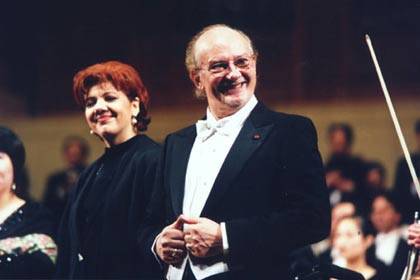Giuseppe Giacomini on YouTube. II PART. "A Singer Lives Spiritually Through their Voice"
The tenor has released an interview on July 8th 2006 published on YouTube by Agatarco. The interview is in Italian. Reading the comments, though, we found people who wished that this interview could be translated in English, accessible to a larger audience of opera lovers
Okay here we go - this is pretty much my relationship with my faith: I think the moment has passed - after 40 years of the operatic world being in the hands of various different people – but my dream has always been (and in some ways, I’m still convinced) that the spirituality of the voice has the capability to convert and unite both the good and nasty people of the world. You can live together with any political color or intention. The voice doesn’t bring evil, only good… deep good, that one does not need so many words to understand. This is my message, and this has been at the same time my biggest source of suffering.
When I started singing, thank God, there were way more possibilities than there are today to start a career in the right way. There were many people managing theaters both big and small who were people of theater - they lived spiritually through the voice. This is very important. Now, though, those days are gone. There are no longer the so called ‘small theaters’, nor instances of private management – sure people in the past may have thought how to enrich themselves on the success of the singer’s blood and sweat, but they were theatrical people. Today, these are office people (those guided more by their administrative duties and marketing), from political groups and agencies.
They say “I want this famous singer… and let’s hire this other one alongside him. Let’s do this opera and see who is available on the agency’s book (on the list)? Who is the best singer represented from the strongest agency?” Whether or not these choices are appropriate matters so much less. Nobody seems to think about which singers are appropriate (especially together) for which opera anymore. These things that seem so intuitive in the world of opera are lost in attempt to sell more tickets or promote a bigger production.
Once upon a time, they would evaluate your voice and your abilities very accurately, and then would say: we believe that next season you could sing Tosca or Fedora, and maybe you could do this other role, etc. This kind of management operated for the singer’s sake. They used wonderful intuitions. Which theatrical people, nowadays, do the same?
Perhaps one name or two come to my mind, but in general this is a world that has completely disappeared. This world is now managed by bureaucrats and politicians. Don’t you dare start telling me that I shouldn’t talk about things like religion or politics for which everyone has different opinions, because in a way the political presence in theaters is necessary. Let me tell you, though, that theaters managed in this way today are going to face a sure and immediate end. There must be a specific interest from a private institution or organization (one that is ready for the possibility of getting its fingers burned) in funding the successful theaters.
This, however, does not exist anymore and that is why we are gradually losing all the work that has been done in the past generation, especially concerning the young singer’s career – nurturing young singers in the right roles to make the young singer grow towards a career of endurance and vocal health. A healthy career, after all, is full of “No’s” too! I myself have had crazy offers for the interest of some specific theater (do this or that), despite the overwhelming feeling that my conscience was saying NO or that I felt, in general, not ready for this specific offer.
For example, I had people insisting in asking me to make a debut in Un Ballo in Maschera. I looked at the score – it was in the early years of my career – and said: I can’t sing this! At that point in my career, I wouldn’t have been able sing that role in such a way to convey what it was that I felt inside me. Of course now I have some regrets that I have never had another chance to sing this amazing role, although I know that at the time it would have been a much larger regret by not doing it justice. While we’re on the subject, I might as well tell you that there have been so many other things that I’ve said no to! I needed to say no because the voice wasn’t ready. And trust me, it took me a long time to pay off my debts to all of the friends that supported through 10 years of “No’s” in my career - 10 years!
Luckily, God kept me healthy and I already had a family: I knew I wasn’t going to starve, but how many times I had to say NO. I knew that I had to invest in my technique and my personality - both things that came slowly and in with much difficulty. These things are probably also a result of my peasant origins, but you should know that I’m not saying this because I want to point out that I was able to climb from peasant to Opera Star. The origins are rather to explain the pure soul - the honesty that brings you to invest your whole being in what you do and believe so that tomorrow you can be better off than you are today!


































i-Italy
Facebook
Google+
This work may not be reproduced, in whole or in part, without prior written permission.
Questo lavoro non può essere riprodotto, in tutto o in parte, senza permesso scritto.